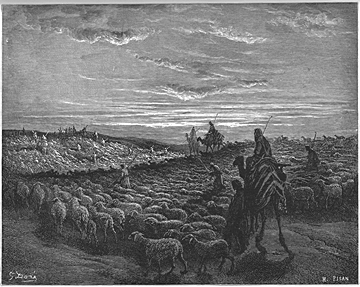Genesisy 12
1 Hoe t’Iehovà amy Avrame, Mañaveloa mb’eo; iengao ty tane’o, boak’ amo rolongo’oo naho isitaho ty anjomban-drae’o, vaho mionjona mb’an-tane hatoroko azo añe;
Then Yahweh said to Abram, “Leave this country where you are now living. Leave your father’s clan and his family. Go to a land that I will show you.
2 le hanoeko tariratse ra’elahy, naho ho tahieko, le ho bangoeko ty tahina’o, vaho ho fañanintsin-drehe.
I will cause your descendants to become a large nation. I will bless you and cause you to become (famous/highly esteemed). What I do for you will be a blessing to others.
3 Ho tahieko ze mitat’azo naho hafàko ze mamatse azo; vaho ama’o ro hitahiañe ze hene hasavereña’ ty tane toy.
I will bless those who (bless/ask God to do good things for) you, and I will (curse/ask God to punish) those who do evil things to you. And because of what you do, groups of people all over the earth will receive blessings (OR, people will wish that God will bless others as much as he has blessed you).”
4 Aa le nienga amy nitsarà’ Iehovà t’i Avrame, vaho nindreza’ i Lote. Nifitompolo taoñe lim’amby t’i Avrame te niakatse i Kharane.
So Abram left Haran [town], as Yahweh told him to do. Abram was 75 years old when he left there along with his wife, Sarai, and his nephew, Lot.
5 Nente’ i Avrame t’i Sarae vali’e naho ty ana-drahalahi’e Lote, naho ze vara natonto’e vaho ondaty niazo’e e Kharane iabio, le nionjoñe mb’e Kanàne mb’ eo vaho nandoak’ an-tane Kanàne ao.
Abram also took along all the possessions and slaves that they had accumulated/acquired in Haran [town], and they left there and went to Canaan land.
6 Niranga i taney t’i Avrame am-para’ te nitoetse e Sikeme amo hatae bei’ i Morèo. An-tane eo henane zay ty nte-Kanàne.
In Canaan they traveled as far as Shechem [town] and camped by a huge tree called the tree of Moreh. The Canaan people-group were still living in that land.
7 Nisodeha amy Avrame t’Iehovà nanao ty hoe: Hatoloko amo tarira’oo ty tane toy, le teo ty nañoreña’e kitrely am’Iehovà niheo ama’ey.
Then Yahweh appeared to Abram and said to him, “I will give this land to your descendants.” Then Abram built a stone altar to offer a sacrifice to Yahweh because Yahweh had appeared to him.
8 Nienga re nionjomb’am-bohitse atiñana’ i Betele añe le nañoren-kiboho, ahandrefa’e ty Betele, atiñana’e ty Aý. Teo ty nañoreña’e kitrely am’ Iehovà vaho nikanjy ty tahina’ Iehovà.
From Shechem, Abram and his family traveled to the hills that were east of Bethel [town]. Bethel [town] was to the west of where they set up their tent, and Ai [town] was further to the east. There he built another stone altar and offered a sacrifice and worshiped Yahweh there.
9 Le mbe nionjoñe mb’amy fañaveloa’e mb’e Nègeve mb’eoy t’i Avrame.
Then they left there and started traveling south to the Negev [Desert].
10 Nimosare i taney, le nizotso mb’e Mitsraime mb’eo hey t’i Avrame nitaveañe añe ty amy fanindria’ i hasalikoañey.
There was (a famine/very little food to eat) in Canaan, so they went south to live in Egypt for a while.
11 Ie fa himoak’e Mitsraime ao, le hoe re amy Sarae vali’e: Inao, apotako ty hasoa vinta’o te isaheñe.
Just as they were about to enter Egypt, Abram said to his wife Sarai, “Listen, I know that you are a very beautiful woman.
12 Aa naho mahaisak’ azo o nte-Mitsraimeo le, inao: Vali’e iroa, ty ho asa’iareo, naho hañe-doza amako naho hahaen-ko velon-drehe.
When the people in Egypt see you, they will say, ‘This woman is his wife!’ and they will kill me in order to get you, but they will not kill you.
13 Ehe, ano ty hoe rahavaveko, hanintsiñako ty ama’o hameloma’o ty fiaiko.
So I ask you to tell them that you are my sister, so that because of you telling them that, they will (spare my life/not kill me).”
14 Ie niavy e Mitsraime añe t’i Avrame le nioni’ o nte-Mitsraimeo ty hamozohozo’ i rakembay.
And as soon as they arrived in Egypt, the people in Egypt saw that his wife was indeed very beautiful.
15 Ie niisa’ o menafoe’ i Paròo, le nitsiririe’ iareo amy Parò, vaho nasese añ’anjomba’ i Parò ao.
When the king’s officials saw her, they told the king how beautiful she was. And they took her to the king’s palace.
16 Nirambese’e an-talatalasaba ty ama’e t’i Avrame, vaho nanontoñe añondry naho añombe t’i Avrame naho borìke lahi’e, naho mpitoron-dahy naho ampela, naho borìke vave vaho rameva.
The king treated Abram kindly because of Sarai, and he gave Abram many sheep and cattle and donkeys and male and female slaves and camels.
17 Fe nampivolevolè’ Iehovà añ’ angorosy t’i Parò naho ze añ’anjomba’e ao iaby ty amy Sarae, vali’ i Avrame.
But because the king had taken Sarai, Abram’s wife, Yahweh caused the king and the others in his household to be inflicted with terrible diseases.
18 Aa le kinanji’ i Parò t’i Avrame, le hoe ty asa’e: Ino o nanoa’o ahio. Manakore te tsy natao’o amako t’ie vali’o?
When the king realized why that was happening, he summoned Abram and said to him, “Why did you do this to me? Why did you not tell me that she was your wife?
19 Ino ty nanoa’o ty hoe, Rahavaveko? hera ho rinambeko ho valiko? Ie amy zao, ingo i vali’oy rambeso vaho akia!
Why did you lie, saying she is your sister, with the result that I took her to be my wife? You should not have done that! So now take your wife, leave here and go!”
20 Aa le nafanto’ i Parò amo mpitoro’eo ty Avrame, naho nampionjone’ iereo mb’eo rekets’ i vali’ey vaho ze hene fanaña’e.
Then the king told his officials/servants to take Abram and his wife and all his possessions out of Egypt.





















